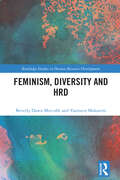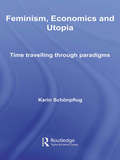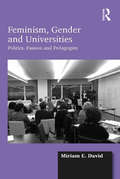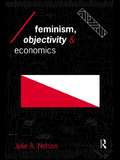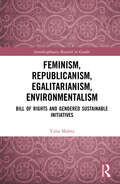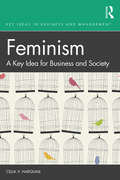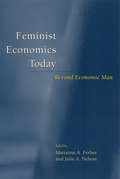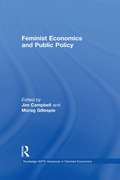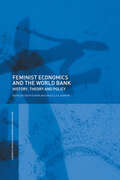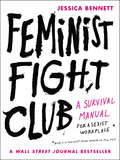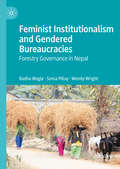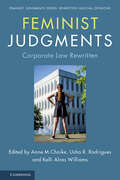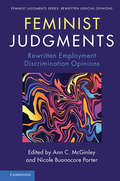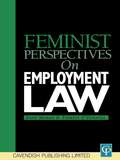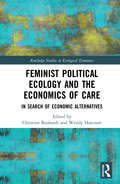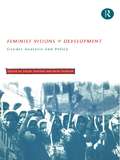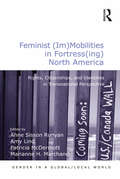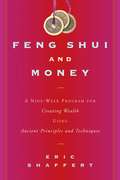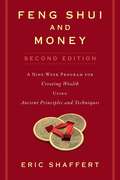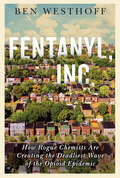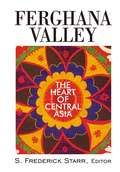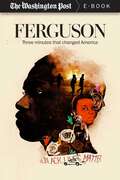- Table View
- List View
Feminism, Diversity and HRD (Routledge Studies in Human Resource Development)
by Beverly Dawn Metcalfe Yasmeen MakaremFeminism, Diversity and HRD aims to enhance critical understandings of feminism, diversity and HRD theorization and practice in the global political economy. This involves addressing race, class and intersectional approaches to evaluating inequalities in society/organizations.The book will bring together cutting-edge analysis to offer a critical interdisciplinary overview of the feminism, diversity and HRD debates that are only just emerging. Crucially, it will offer new insights on the governance and policy-making dimensions of national HRD, and the gender agendas advocated by global institutions which are influenced by social justice themes.In this respect, the contributions in this volume offer more than just a tried and tested analysis of the political, knowledge and skill gap problems that face organizations and nation states. Rather, they are agenda-setting and forward-looking since they critically consider what the HRD solutions currently on offer are, and how they can be further improved. Thus, the contributions will cover theoretical and policy perspectives not previously covered in a critical text of this kind.
Feminism, Economics and Utopia: Time Travelling through Paradigms (Routledge Frontiers Of Political Economy Ser.)
by Karin SchonpflugAre there feminist, economic utopian visions amongst feminist economists? What are these visions? Is there a common vision for feminist economics or should there be? Can feminist economics be effective without a utopian vision?Comprehensive and original, this book surveys the entire field of utopian literature; from Plato to the present. Answering
Feminism, Gender and Universities: Politics, Passion and Pedagogies
by Miriam E. DavidFeminism, Gender and Universities demonstrates the positive and robust impacts that feminism has had on higher education, through the eyes and in the words of the participants in changing political and social processes. Drawing on the ’collective biography’ of leading feminist scholars from around the world and current evidence relating to gender equality in education, this book employs methods including biographies, life histories, and narratives to show how the feminist project to transform women’s lives in the direction of gender and social equality became an educational and pedagogical one. Through careful attention to the ways in which feminism has transformed feminist academic women’s lives, the author explores the importance of education in changing socio-political contexts, raising questions about further changes that are necessary. Delving into the deeper and more ’hidden’ echelons of education, the book examines the contested nature of current managerial or business approaches to university and education, revealing these to be incompatible with feminist thought. A plea for more careful attention to education and the ways in which the processes of knowledge-making influence (and are influenced by) gender and sexual relations, Feminism, Gender and Universities will appeal to scholars across the social sciences with interests in gender, pedagogy and modern academic life.
Feminism, Objectivity and Economics
by Julie NelsonFirst published in 1995. Routledge is an imprint of Taylor & Francis, an informa company.
Feminism, Republicanism, Egalitarianism, Environmentalism: Bill of Rights and Gendered Sustainable Initiatives (Interdisciplinary Research in Gender)
by Yulia MaletaThis book addresses hegemonic ruling class masculinity and emphasized femininity within renewables organisational governance, and critiques Anglo-Celtic male privilege, as a barrier to women’s leadership participation. Primarily using the Australian socio-political context, the author considers the patriarchal control of organisations and renewables governance, and argues that women-led emphasized femininity-resistance strategies can challenge the hegemonic status of ruling elites to create a leadership that is less power oriented, more collaborative and open to change. Utilising detailed interviews with Australian women environmentalists, together with feminist, sociological and social movement theory, whilst considering the historic context of Red Vienna and contemporary political challenges (Brexit, Monarchism etc.), it puts forward an innovative policy framework for an Australian Bill of Rights Act and republican constitutional change. Written for academics, activists and policymakers alike, this book offers a unique insight into women’s inequity within patriarchal institutionalist governance. It will be engaging and inspiring reading for feminist and environmentalist activists and practitioners, in addition to professional associations focussing on gender, justice and environmental change. Academics and postgraduates in Gender Studies, Ecofeminism, Sociology and Organisational Studies will also find the book of key interest in its interdisciplinary discussions of Sustainable Scientific-Technological Development Initiatives (SSTDI) and feminism in an Australian political context.
Feminism: A Key Idea for Business and Society (Key Ideas in Business and Management)
by Celia V. HarquailIn this concise book, feminist thought is made accessible and relevant to both students and management practitioners. An empowering introduction to an often-overlooked key idea, this book illuminates how feminist thinking can liberate our understanding of work and management. Feminism: A Key Idea for Business and Society boldly challenges assumptions about both feminism and business. It offers a primer on feminism for business and explains feminist interventions including adding women’s voices, pushing for equality, and practicing feminist values to make businesses more successful and more just. It analyzes the obstacles organizations and individuals face in their efforts to address gender inequality, and demonstrates how feminist interventions have changed the terms of business conversations around topics such as defining work, centering the economy around care, how jobs work and wages are gendered, violence in the workplace, horizontal and peer-to-peer organizational structures that don’t depend on dominance, enlightened leadership models, and power. As this book demonstrates, feminism has already had a profound impact on business, with many of its key tenets incorporated into business thinking. As one of the first books to offer feminist insights and critiques of business to the practicing manager, business student, and non-academic, this book offers a fresh, positive vision that is remarkably relevant.
Feminist Economics Today: Beyond Economic Man
by Marianne A. Ferber and Julie A. NelsonThe 1993 publication of Marianne A. Ferber and Julie A. Nelson's Beyond Economic Man was a landmark in both feminist scholarship and the discipline of economics, and it quickly became a handbook for those seeking to explore the emerging connections between the two. A decade later, this book looks back at the progress of feminist economics and forward to its future, offering both a thorough overview of feminist economic thought and a collection of new, high-quality work from the field's leading scholars.
Feminist Economics and Public Policy (Routledge IAFFE Advances in Feminist Economics)
by Jim Campbell Morag GillespieProfessor Ailsa McKay, who was known not only for her work as a feminist economist but also her influence on Scottish social and economic policy, died in 2014 at the height of her academic career and impact on public life. Organised around the key themes of Ailsa McKay’s work, this collection brings together eminent contributors to argue for the importance of making women's roles and needs more visible in economic and social policies. Feminist Economics and Public Policy presents a uniquely coherent analysis of key issues including gender mainstreaming, universal childcare provision and universal basic income security, in the context of today’s challenging economic and political environments. It draws on international perspectives to look at the economic role of women, presenting readers with interrelated sections on gender budgeting and work and childcare, before concluding with a discussion on Citizens Basic Income and how it could contribute towards a more efficient, equitable social security system. The theoretical, empirical and practice based contributions assembled here present recommendations for more effective public policy, working towards a world in which women’s diverse roles are recognized and fully accounted for. This book is a unique collection, which will be of great relevance to those studying gender and economics, as well as to researchers or policy makers.
Feminist Economics and the World Bank: History, Theory and Policy (Routledge IAFFE Advances in Feminist Economics #3)
by Drucilla K. Barker Edith KuiperThe past decade has witnessed a paradigm shift at the World Bank from a focus on structural adjustment to a focus on poverty reduction. As evidenced by the Bank’s 2001 report, Engendering Development: Through Rights, Resource and Voice, an increased attention to gender issues has been an important part of this process. This book brings together a range of responses from feminist economists and other social researchers on the issues raised in this report. With contributions from highly esteemed scholars such as Eudine Barriteau, Diane Elson, Gale Summerfield, and Zafiris Tzannatos, this anthology critically examines the relationships between gender, growth, development, and the World Bank by: developing a history of the World Bank’s perspectives on gender empirically evaluating the impacts of the Banks’ policies on three different regions of the world exploring the ideological and methodological commitments of the report from a variety of feminist and interdisciplinary social science perspectives enquiring into future directions for feminist economics research. Highlighting the importance and challenge of taking gender into account in development theory and policy, this book’s complex and nuanced analyses of the social relations of gender in a global context make it an important resource for policymakers, activists and scholars alike.
Feminist Fight Club: An Office Survival Manual for a Sexist Workplace
by Jessica BennettPart manual, part manifesto, a humorous yet incisive guide to navigating subtle sexism at work--a pocketbook Lean In for the Buzzfeed generation that provides real-life career advice and humorous reinforcement for a new generation of professional women.It was a fight club--but without the fighting and without the men. Every month, the women would huddle in a friend's apartment to share sexist job frustrations and trade tips for how best to tackle them. Once upon a time, you might have called them a consciousness-raising group. But the problems of today's working world are more subtle, less pronounced, harder to identify--and, if Ellen Pao is any indication, harder to prove--than those of their foremothers. These women weren't just there to vent. They needed battle tactics. And so the fight club was born.Hard-hitting and entertaining, Feminist Fight Club blends personal stories with research, statistics, infographics, and no-bullsh*t expert advice. Bennett offers a new vocabulary for the sexist workplace archetypes women encounter everyday--such as the Manterrupter who talks over female colleagues in meetings or the Himitator who appropriates their ideas--and provides practical hacks for navigating other gender landmines in today's working world. With original illustrations, Feminist Mad Libs, a Negotiation Cheat Sheet, as well as fascinating historical research and a kit for "How to Start Your Own Club," Feminist Fight Club tackles both the external (sexist) and internal (self-sabotaging) behaviors that plague today's women--as well as the system that perpetuates them.
Feminist Institutionalism and Gendered Bureaucracies: Forestry Governance in Nepal
by Soma Pillay Wendy Wright Radha WagleThis book examines the processes for the inclusion of women, and the role of women employees in Nepal’s forestry bureaucracy. The book adopts a “gender lens” drawn from feminist institutionalism and is framed around the following four objectives: evaluating the effectiveness of current legislative and policy frameworks for the inclusion of women in the Nepalese forest bureaucracy; examining the dynamics of organizational culture, formal and informal institutions, and structure and agency in and around forest bureaucracy in Nepal; assessing power relations in forestry institutions focusing on influential participation of women forestry professionals in the bureaucratic structure; and gaining insights about the alternative space of feminist institutionalism in connection with women inclusive forest bureaucracy.Findings in the book inform and extend feminist institutionalism perspectives by applying it to a context which remains under explored, providing insights on the efficacy of public sector cultural change, especially as it relates to those areas within bureaucracies less in a position to adopt the changes mandated by society and principles of good governance.
Feminist Judgments: Corporate Law Rewritten (Feminist Judgment Series: Rewritten Judicial Opinions)
by Anne M. Choike Usha R. Rodrigues Kelli Alces WilliamsCorporate law has traditionally assumed that men organize business, men profit from it, and men bring cases in front of male judges when disputes arise. It overlooks or forgets that women are dealmakers, shareholders, stakeholders, and businesspeople too. This lack of inclusivity in corporate law has profound effects on all of society, not only on women's lives and livelihoods. This volume takes up the challenge to imagine how corporate law might look if we valued not only women and other marginalized groups, but also a feminist perspective emphasizing the importance of power dynamics, equity, community, and diversity in corporate law. Prominent lawyers and legal scholars rewrite foundational corporate law cases, and also provide accompanying commentary that situates each opinion in context, explains the feminist theories applied, and explores the impact the rewritten opinion might have had on the development of corporate law, business, and society.
Feminist Judgments: Rewritten Employment Discrimination Opinions (Feminist Judgment Series: Rewritten Judicial Opinions)
by Ann C. McGinley Nicole Buonocore PorterHow would feminist perspectives and analytical methods change the interpretation of employment discrimination law? Would the conscious use of feminist perspectives make a difference? This volume shows the difference feminist analysis can make to the interpretation of employment discrimination statutes. This book brings together a group of scholars and lawyers to rewrite fifteen employment discrimination decisions in which a feminist analysis would have changed the outcome or the courts' reasoning. It demonstrates that use of feminist perspectives and methodologies, if adopted by the courts, would have made a significant difference in employment discrimination law, leading to a fairer and more egalitarian workplace, and a more prosperous society.
Feminist Perspectives on Employment Law (Feminist Perspectives)
by Anne Morris Thérèse O'DonnellWhilst equal pay, maternity rights and sex discrimination, including sexual harassment, have received attention from feminist scholars, there is an increasing awareness that it is the whole of the working environment that must be examined if real progress is to be made.
Feminist Political Ecology and the Economics of Care: In Search of Economic Alternatives (Routledge Studies in Ecological Economics)
by Wendy Harcourt Christine BauhardtThis book envisages a different form of our economies where care work and care-full relationships are central to social and cultural life. It sets out a feminist vision of a caring economy and asks what needs to change economically and ecologically in our conceptual approaches and our daily lives as we learn to care for each other and non-human others. Bringing together authors from 11 countries (also representing institutions from 8 countries), this edited collection sets out the challenges for gender aware economies based on an ethics of care for people and the environment in an original and engaging way. The book aims to break down the assumed inseparability of economic growth and social prosperity, and natural resource exploitation, while not romanticising social-material relations to nature. The authors explore diverse understandings of care through a range of analytical approaches, contexts and case studies and pays particular attention to the complicated nexus between re/productivity, nature, womanhood and care. It includes strong contributions on community economies, everyday practices of care, the politics of place and care of non-human others, as well as an engagement on concepts such as wealth, sustainability, food sovereignty, body politics, naturecultures and technoscience. Feminist Political Ecology and the Economics of Care is aimed at all those interested in what feminist theory and practice brings to today’s major political economic and environmental debates around sustainability, alternatives to economic development and gender power relations.
Feminist Visions of Development: Gender Analysis and Policy
by Ruth Pearson Cecile JacksonIn the wake of the 4th World Conference on Women this volume brings together leading gender and development scholars who interrogate the last twenty years of work in this area.Feminist Visions of Development throws fresh light on key issues including:* gender and the environment* education * population * reproductive rights* industrialisation * macroeconomic policy* poverty.Inspired by recent feminist theoretical work, it re-examines previous structural analysis and opens the way for further research in the field.
Feminist: Rights, Citizenships, and Identities in Transnational Perspective (Gender in a Global/Local World)
by Marianne H. Marchand Amy LindSince the establishment of the North American Free Trade Agreement (NAFTA) tensions concerning immigration trends and policies, which continued to escalate at the turn of the millennium resulted in revised national security policies in Mexico, Canada, and the United States. These tensions have catalyzed the three governments to rethink their political and economic agendas. While national feminist scholarship in and on these respective countries continue to predominate, since NAFTA, there has been increasing feminist inquiry in a North American regional frame. Less has been done to understand challenges of the hegemonies of nation, region, and empire in this context and to adequately understand the meaning of (im)mobility in people's lives as well as the (im)mobilities of social theories and movements like feminism. Drawing from current feminist scholarship on intimacy and political economy and using three main frameworks: Fortressing Writs/Exclusionary Rights, Mobile Bodies/Immobile Citizenships, and Bordered/Borderland Identities, a handpicked group of established and rising feminist scholars methodically examine how the production of feminist knowledge has occurred in this region. The economic, racial, gender and sexual normativities that have emerged and/or been reconstituted in neoliberal and securitized North America further reveal the depth of regional and global restructuring.
Feng Shui and Money: A Nine-Week Program for Creating Wealth Using Ancient Principles and Techniques
by Eric ShaffertDevelop wealth and prosperity using the easy-to-apply feng shui principles contained in this unique guide. Easy to understand and fun to read, this entertaining volume helps readers to connect to the spiritual and psychological dimensions of their financial lives using the proven principles of feng shui. With the history of feng shui and money for starters, the book covers the basic principles of feng shui thought, innovative suggestions for favorable interior arrangements at home and in the office, rituals to create prosperity, chi enhancement exercises, and valuable advice on how to tend to one's spiritual landscape. A nine-week action plan inspires readers to translate the suggestions of the book into an individual, achievable program of financial and spiritual renewal. Written by an experienced psychotherapist and feng shui consultant, this pragmatic yet sensitive guidebook is a refreshing and lively blend of Asian spirituality and Western psychological insight.
Feng Shui and Money: A Nine-Week Program for Creating Wealth Using Ancient Principles and Techniques (Second Edition)
by Eric Shaffert"Eric has brightly lit each step of the path to abundance. Take a nine-week walk with him—you won't regret it!" —Karen Rauch Carter, author of the bestselling Move Your Stuff, Change Your Life In Feng Shui and Money, Second Edition, Eric Shaffert divulges the secrets to creating wealth using the principles of feng shui. Through the easy nine-week program, readers will discover the basic principles and philosophy of feng shui, the spiritual connection between feng shui and money, innovative suggestions for successful interior arrangements at home and in the office, ancient rituals and meditations to create prosperity, and simple guidelines for setting your goals and making real your dreams. This newly revised edition includes updated information on such topics as: Insights into your "money script" Profound ways to shift the financial flow in your life Feng shui "cures" for energetic and financial "leaks" Success stories from feng shui students and clients New insights that focus on the metaphysical and nondual aspects of feng shui Blending Eastern spirituality and Western psychological insight, Feng Shui and Money is an easy-to-follow guidebook that will lead to financial and spiritual renewal.
Fentanyl Nation: Toxic Politics and America's Failed War on Drugs
by Ryan HamptonA passionate call to abandon ineffective drug-war policies, reframe addiction as a public health issue, and end the Fentanyl crisis.The American overdose crisis has reached record-breaking heights; preventable overdoses are now responsible for more annual deaths than traffic accidents, suicide, or gun violence. Fentanyl—a potent, inexpensive, and easy-to-manufacture synthetic opioid—has thoroughly contaminated the drug supply, and while it frequently makes front page news across the country, it remains poorly understood by policymakers and the public. Why, despite all of our efforts to raise awareness and billions of dollars of investments, does this emergency keep getting worse?In Fentanyl Nation, recovery advocate Ryan Hampton separates the facts from the fiction surrounding Fentanyl, and shows how overdose deaths are ultimately policy failures. Instead of investing in education, harm reduction, effective treatment, and recovery, we have doubled down on more police, more incarceration, and harsher penalties for those caught in the grip of addiction. Yet history has shown time and time again that it is impossible to arrest our way out of a public health crisis; the government used the same strategy to fight the crack-cocaine epidemic of the 80s and 90s, and it only resulted in racially disparate policing and the destruction of marginalized communities.This urgent and informative manifesto reveals how prejudice, discrimination, and stigma have been codified into our drug laws, and calls for a compassionate and evidence-based approach that would address the core causes of addiction and save countless lives. We can end this crisis, but only if we get out of our own way.
Fentanyl, Inc.: How Rogue Chemists Are Creating the Deadliest Wave of the Opioid Epidemic
by Ben WesthoffA four-year investigation into the world of synthetic drugs?from black market factories to users & dealers to harm reduction activists—and what it revealed.A deeply human story, Fentanyl, Inc. is the first deep-dive investigation of a hazardous and illicit industry that has created a worldwide epidemic, ravaging communities and overwhelming and confounding government agencies that are challenged to combat it. “A whole new crop of chemicals is radically changing the recreational drug landscape,” writes Ben Westhoff. “These are known as Novel Psychoactive Substances (NPS) and they include replacements for known drugs like heroin, cocaine, ecstasy, and marijuana. They are synthetic, made in a laboratory, and are much more potent than traditional drugs” —and all-too-often tragically lethal.Drugs like fentanyl, K2, and Spice?and those with arcane acronyms like 25i-NBOMe? were all originally conceived in legitimate laboratories for proper scientific and medicinal purposes. Their formulas were then hijacked and manufactured by rogue chemists, largely in China, who change their molecular structures to stay ahead of the law, making the drugs’ effects impossible to predict. Westhoff has infiltrated this shadowy world. He tracks down the little-known scientists who invented these drugs and inadvertently killed thousands, as well as a mysterious drug baron who turned the law upside down in his home country of New Zealand. Westhoff visits the shady factories in China from which these drugs emanate, providing startling and original reporting on how China’s vast chemical industry operates, and how the Chinese government subsidizes it. Poignantly, he chronicles the lives of addicted users and dealers, families of victims, law enforcement officers, and underground drug awareness organizers in the United States and Europe. Together they represent the shocking and riveting full anatomy of a calamity we are just beginning to understand. From its depths, as Westhoff relates, are emerging new strategies that may provide essential long-term solutions to the drug crisis that has affected so many.“Timely and agonizing. . . . An impressive work of investigative journalism.” —USA Today“Westhoff explores the many-tentacled world of illicit opioids, from the streets of East St. Louis to Chinese pharmaceutical companies, from music festivals deep in the Michigan woods to sanctioned ‘shooting up rooms’ in Barcelona, in this frank, insightful, and occasionally searing exposé. . . . Westhoff’s well-reported and researched work will likely open eyes, slow knee-jerk responses, and start much needed conversations.” —Publishers Weekly“Our 25 Favorite Books of 2019” —St. Louis Post-Dispatch“Best Books of 2019” —Buzzfeed“Best Nonfiction of 2019” —Kirkus Reviews“50 Best Books of 2019” —Daily Telegraph“Best Nonfiction Books of 2019” —Tyler Cowen“Best Books of 2019” —Yahoo Finance
Ferghana Valley: The Heart of Central Asia (Studies of Central Asia and the Caucasus)
by S. Frederick StarrThe Ferghana Valley can reasonably be said to lie in the heart of Central Asia. As such, the Valley has made an inordinate contribution to the history and culture of the region as a whole, as well as significantly affecting the economic, political and religious spheres. This book looks at the region over time, from its early history to the present. It embraces not just the obvious fields of politics, economics and religion, but also ethnography, sociology and culture, and includes the insights of leading scholars from all three Ferghana countries. The book discusses various questions of identity relating to the region, showing how the identity of the Ferghana Valley relates to the emerging national identities of the three post-colonial states that are still gradually emerging from the demise of the Soviet Union, as well as how an understanding of the Ferghana Valley is key to understanding Central Asia itself.
Fergie Rises: How Britain’s Greatest Football Manager Was Made at Aberdeen
by Michael GrantFULLY REVISED AND UPDATED 'The finest Fergie book of them all' – Tom English, BBC Sport When Sir Alex Ferguson retired at the end of the 2013 season he was the most successful football manager Britain had ever seen, having won twice as many trophies as his nearest rival. But that success had not come easily. Thirty-five years previously he had arrived at the rain-swept training ground at Aberdeen F.C. as the recently sacked manager of St Mirren. Already a divisive figure, this Alex Ferguson came with a reputation for trouble and a lot still to prove. Not for nothing, many thought he was a risky choice. Fergie Rises returns to a time when Ferguson was lucky to get Aberdeen, not the other way around. It's the story of an eight-year revolution that saw the Dons and their ambitious young manager knock the Old Firm off their perch, taste victory in Europe for the first time, and electrify Scottish football. When Ferguson finally left the club for Manchester United, in 1986, fans and rivals were unanimous in believing he had engineered one of the most astonishing upheavals in the game’s history. The author also examines the personal tragedies Ferguson overcame – the deaths of his father and his mentor Jock Stein – and the rivalries, setbacks and triumphs that shaped a sporting genius. 'A masterful retelling of how Ferguson was "made" at Aberdeen' – Alan Pattullo, The Scotsman
Ferguson: Three Minutes that Changed America
by Wesley Lowery The Washington PostFrom the Pulitzer Prize winning Washington Post comes a meticulously detailed, insightful report on the killing that brought the nation's attention to a city coming apart at the seams. 12:00PM: Officer Darren Wilson turns his Chevy Tahoe police cruiser left on Canfield Drive. 12:01PM: Wilson orders two young men, Dorian Johnson and Michael Brown, to get out of the street. 12:04PM: Michael Brown lays dying from bullet wounds. Three minutes in middle America shook a nation to its foundation. To many, it shone a spotlight on the frequently violent, often deadly interactions between young men of color and police departments. It highlighted the racial disparity in policing techniques, in response to crime, and in how race relations are perceived in an America where many incorrectly pride the country on being "post-racial." Renowned journalist Wesley Lowery has pulled together a vast and troubling panorama of reportage on the Ferguson slaying, and the aftermath--the marches, the clashes, and the slow, painful process of building trust between a devastated community and a police department tasked with serving and protecting it. Challenging and necessary, Ferguson engages America in a frank and necessary dialogue about race relations, about legacies of bigotry that continue to this day, and about a path forward as one nation, equal under the law. Contributors include: Joel Achenbach, Mark Berman, Lindsey Bever, Jeremy Borden, Amy Brittain, DeNeen L. Brown, Philip Bump, Jessica Contrera, Jahi Chikwendiu, Niraj Chokshi, Robert Costa, Alice Crites, David A. Fahrenthold, Darryl Fears, Marc Fisher, J. Freedom du Lac, Thomas Gibbons-Neff, Chico Harlan, Dana Hedgpeth, Peter Hermann, Scott Higham, Peter Holley, Sari Horwitz, Greg Jaffe, Sarah Kaplan, Kimbriell Kelly, Kimberly Kindy, Sarah Larimer, Carol D. Leonnig, Jerry Markon, Michael E. Miller, David Montgomery, Brian Murphy, David Nakamura, Abby Phillip, Steven Rich, Manuel Roig-Franzia, Robert Samuels, Sandhya Somashekhar, John Sullivan, Julie Tate, Krissah Thompson, Neely Tucker.
Ferngesteuert?!: Hin zur digitalen Souveränität
by Anabel TernèsFerngesteuert oder digital souverän – wie leben Sie und wie möchten Sie leben? Das Buch Ferngesteuert?! Hin zur digitalen Souveränität entschlüsselt mit spannenden und lebendigen Beispielgeschichten die Hintergründe für unsere Verhaltensweisen im digitalen Alltag. Dieses Buch zeigt uns Möglichkeiten auf, wie wir aus einem bequemen digitalen Ferngesteuert-sein in unserem Alltag ausbrechen können. Dazu vermittelt es, wie wir zu mehr Lebensfreude finden, unserem Leben mehr Sinn geben und unsere Zukunft wieder selbst in die Hand nehmen können. Last but not least macht es Lust darauf, wieder selbst zu entscheiden - das eigene Leben in die Hand zu nehmen, Zukunft als Chance zur eigenverantwortlichen Selbstverwirklichung zu sehen und die Vorteile der Digitalisierung souverän im Leben umzusetzen. Zur Autorin: Anabel Ternès ist eine der führenden Köpfe für Digitalisierungsthemen in Deutschland. Als Digitalunternehmerin, Zukunftsexpertin, Autorin, Verwaltungsrätin und Professorin mit einem großen Engagement für Kinderrechte, Bildung und gesunde werteorientierte Digitalisierung sieht und bewegt Anabel Ternès von Hattburg die großen Herausforderungen, die gelöst werden müssen, um unsere Demokratie und soziale Marktwirtschaft in eine lebenswerte Zukunft für alle zu führen.
